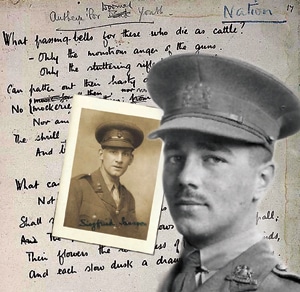“Anthem for Doomed Youth” is a famous poem which is written by Wilfred Owen and depicts the First World War.
He was born on March 18th, 1893 in Oswestry, Shropshire. After school, he became a teaching assistant and in 1913 went to France for two years to work as a language tutor. He began writing poetry as a teenager. In 1995 Owen enlisted in the British Army.
His first experience of active at Serre and St. Quentin in January-April 1917 to shell-shock and return to Britain. While he was undergoing treatment at the Hospital in Edinburgh, he met one of his literary heroes. Siegfried Sassoon, who provided him with guidance, and encouragement to bring his war experiences into his poetry.
In “Anthem for Doomed Youth”, not only has a true portrayal of life but also has fancy writing techniques. The poet uses metaphor and personification. Firstly, the poet uses metaphor to show how the war was cruel. Such as “The shrill, demented choirs of wailing shells.”
Through this sentence, we can imagine the soldiers lived in a heavy shellfire environment, what pitiful men they are! Another writing technique the author of the gun, only the stuttering rifles rapid rattle.” The poet uses personification to show how the thought of him was at that moment. On the Warfield, you just hear shots were fired about in all directions.
In fact, the boys didn’t want to enlist in the army, they didn’t want to die. They had lovers in the hometown and the lovers are extremely worried about them. This poem contains many images related to funerals, death, and mourning. They can reveal the war’s true colors. The poet shows the readers a negative attitude about war. He stands firm against the war. So this poem gives a description of the war and exhorts people to deprecate war, to be peace-loving people.
However, in the beginning, Wilfred Owen’s work was quite conventional. At Craig Lockhart War Hospital Owen met with the war poet Siegfried Sassoon. This meeting seems to have been the real start of Owen’s career as a genuine poet. He uses his poem to condemn the horrors of war and the leader who declared and waged a war.
A parallel instance in “Generals Die in Bed”. Charles Yale Harrison says “We know what soldiering means. It means saving your own skin and getting a bellyful as often as possible…that and nothing else” (Harrison, 49). This instance depicts the significant message that war is not as glorifying as one might believe.

